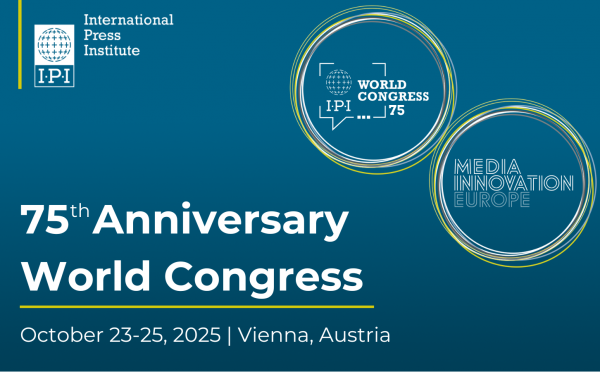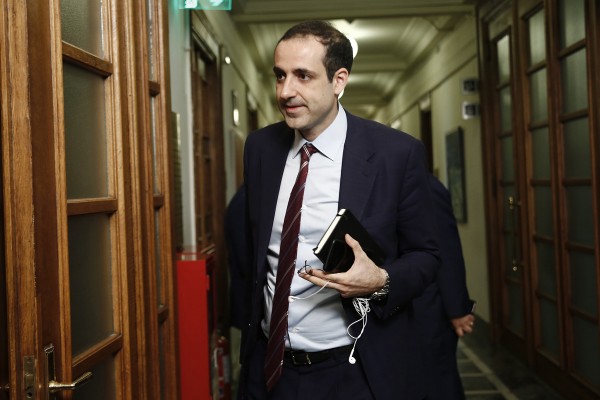The world’s four special rapporteurs on freedom of expression have informed an international audience of media professionals of their grave concern about the increasing level of violence against journalists around the world.
The “four musketeers of press freedom”, as Peter Preston, longtime columnist and former editor of Britain’s Guardian newspaper labeled them, spoke Sunday on a panel during the first session of the International Press Institute (IPI)’s annual World Congress in Port of Spain, Trinidad and Tobago.
Preston moderated the panel on which Frank La Rue, the United Nation’s special rapporteur on Freedom of Opinion and Expression; Dunja Mijatović, representative on Freedom of the Media for the Organization for Security and Cooperation in Europe (OSCE); Catalina Botero, special rapporteur on Freedom of Expression for the Organization of American States (OAS); and Pansy Tlakula, special rapporteur on Freedom of Expression and Access to Information for the African Commission on Human and Peoples’ Rights (ACHPR), presented a grim picture of press freedom around the globe.
“From a global perspective, I see that there is an increase in harassment and violence against journalists,” La Rue said. “It has increased dramatically as a result of the Internet. Given what happened in the Arab Spring…there is a phenomenon of engaged citizens and that has created panic among world leaders.”
The U.N. representative said violence against journalists included physical attacks, sexual assaults, kidnappings, legal harassment and the governmental use of technology to block communications.
“The biggest reason for the increase in violence is that the violence that already exists is not investigated,” he added, speaking of the problem of known as “impunity.” “We have to show political will to tackle that problem.”
Botero said the main obstacle to building a healthy environment for freedom of expression is violence against journalists, followed by the issue of impunity.
“We must correct two misconceptions,” she said. “The first is that crimes against the press aren’t particularly severe: There is no understanding among states as to why a crime against a journalist is a particularly serious situation in a democratic society. The second is that Latin America is doomed to impunity.”
The OAS special rapporteur highlighted the current use of laws against journalists in the region. “One issue that we thought we had overcome was criminal prosecution for the exercise of freedom of expression, [and] sentences of years in prison and [fines of] millions of dollars for journalists or editors for issuing an opinion,” she said. “There are prison sentences that we have not seen in the region for a long time. It’s a new trend and it worries us.”
Botero also pointed to the use of advertising or the allocation of frequencies to reward pro-government media, or the use of public discourse to stigmatize those who thought differently. She said it was necessary to improve access to information in the region. At the same time, she said, the ultimate challenge for freedom of expression in Latin America was the concentration of media ownership, which prevented a pluralistic environment in which all ideas can circulate.
“We are concerned by oligopolies and the concentration of public media concentration,” she said. “It is very important to apply anti-concentration laws—antitrust–which would allow more diversity.”
Mijatović of the OSCE added psychological intimidation to the violence, intimidation and threats that journalists face. “It is hidden, but it has a big effect,” she said. “Not only the reporter but also his family are attacked.”
She warned that even in countries with long democratic traditions in Europe, there were violations in the area of the Internet. “The trend we are witnessing is disturbing and shows that governments are increasingly frightened. The Internet exposes more. So they attack the people trying to expose these situations.”
Turning to the problems in Africa, Tlakula listed laws that criminalize defamation, violence against journalists covering elections, low wages that lead to a lack of ethical journalism, and the absence of self-regulatory mechanisms among media. She reported that her office had written a model law on access to information that was available to the countries of the region that had not yet adopted such legislation. It had also begun a campaign for the abolition of laws on the continent that criminalize defamation.
The speakers, who later presented at the IPI Congress a joint declaration on crimes against freedom of expression, called for the public and media to work together. “In terms of safety and violence against journalists, I see no other way to publish information and make noise about it,” Mijatović said.
La Rue added: “Sometimes making noise with the voice of different organizations can save someone’s life. Rather than add lawyers and politicians, we must include public opinion. It will be the power of the public that makes the difference.”


